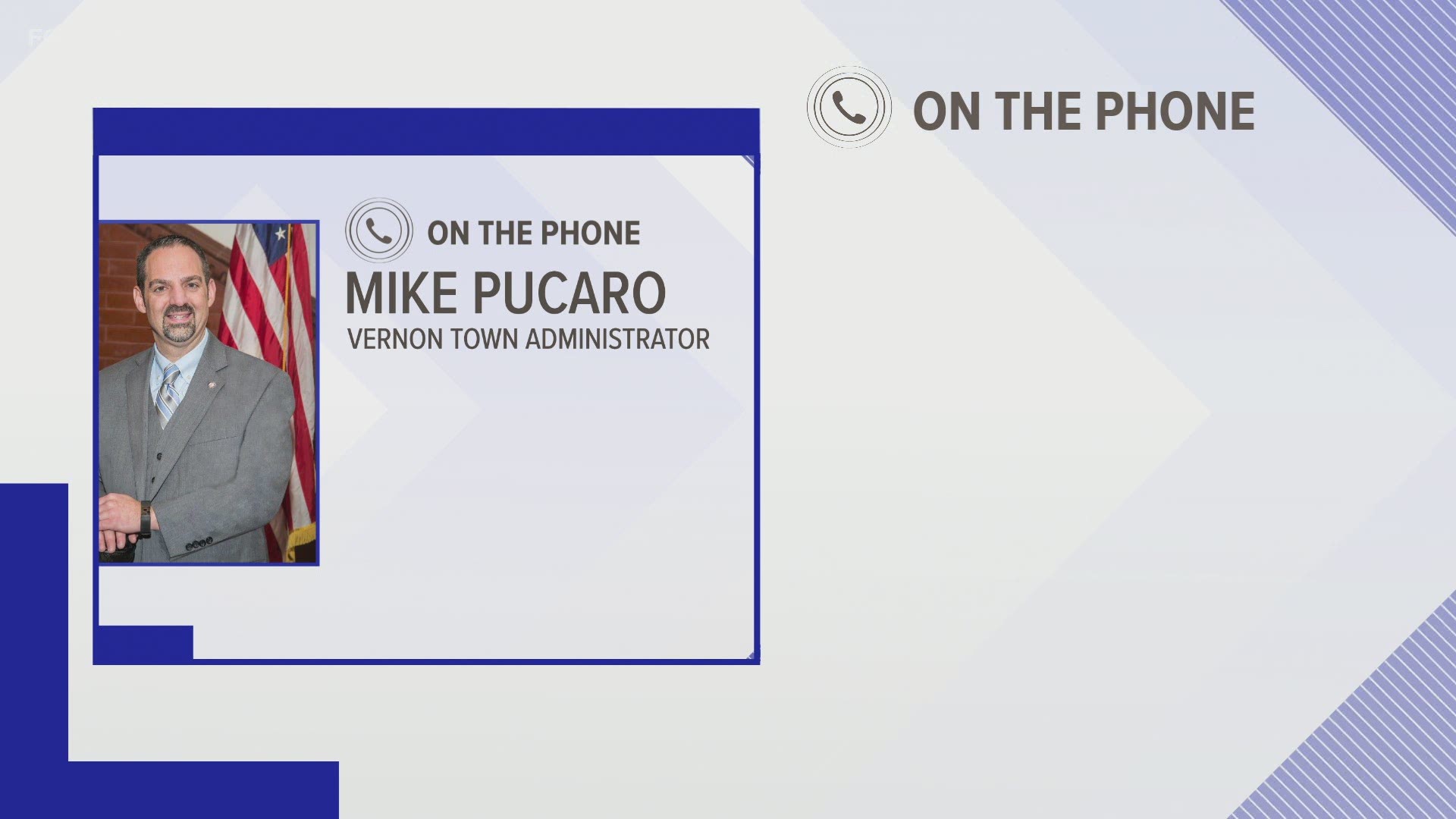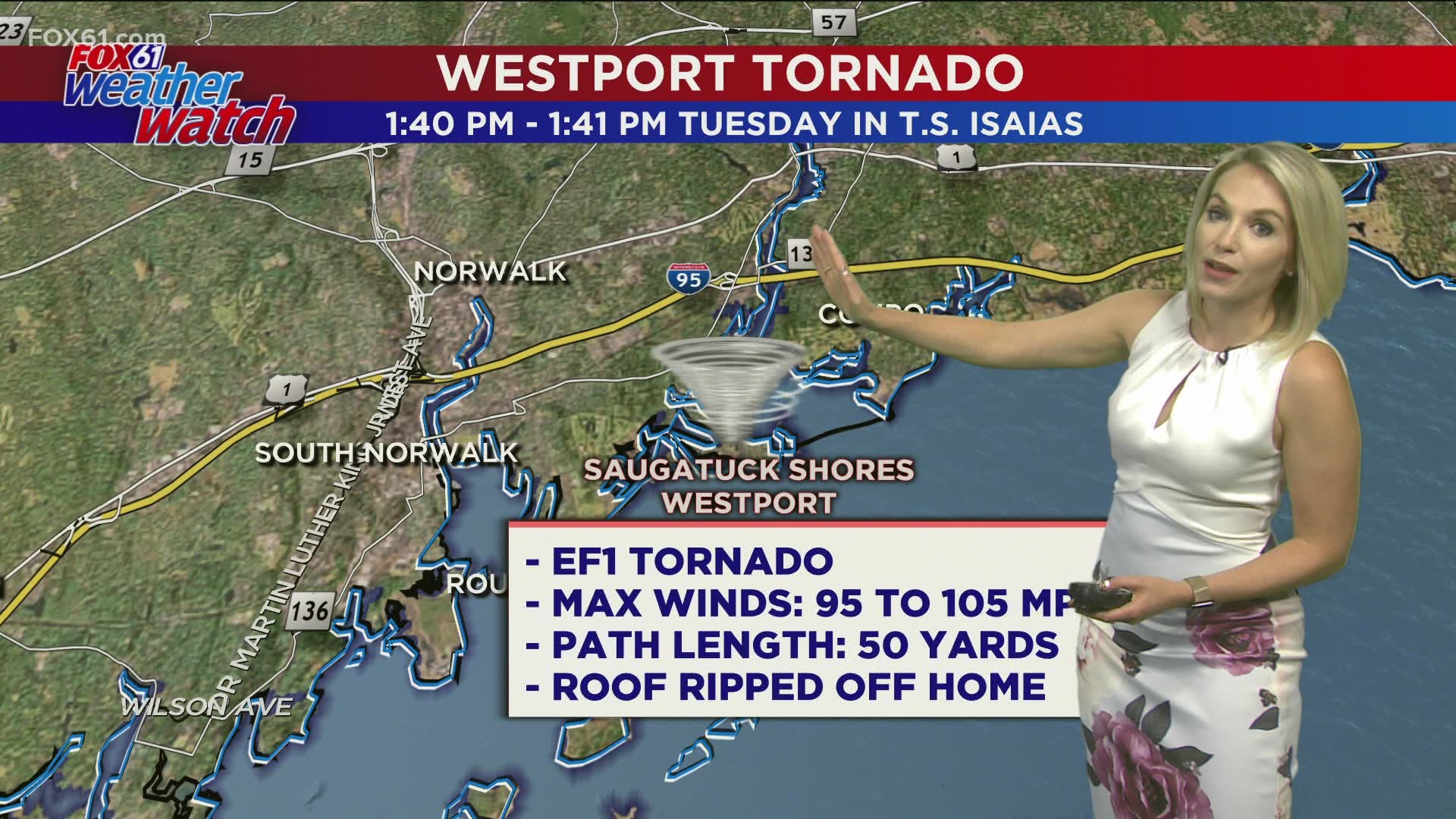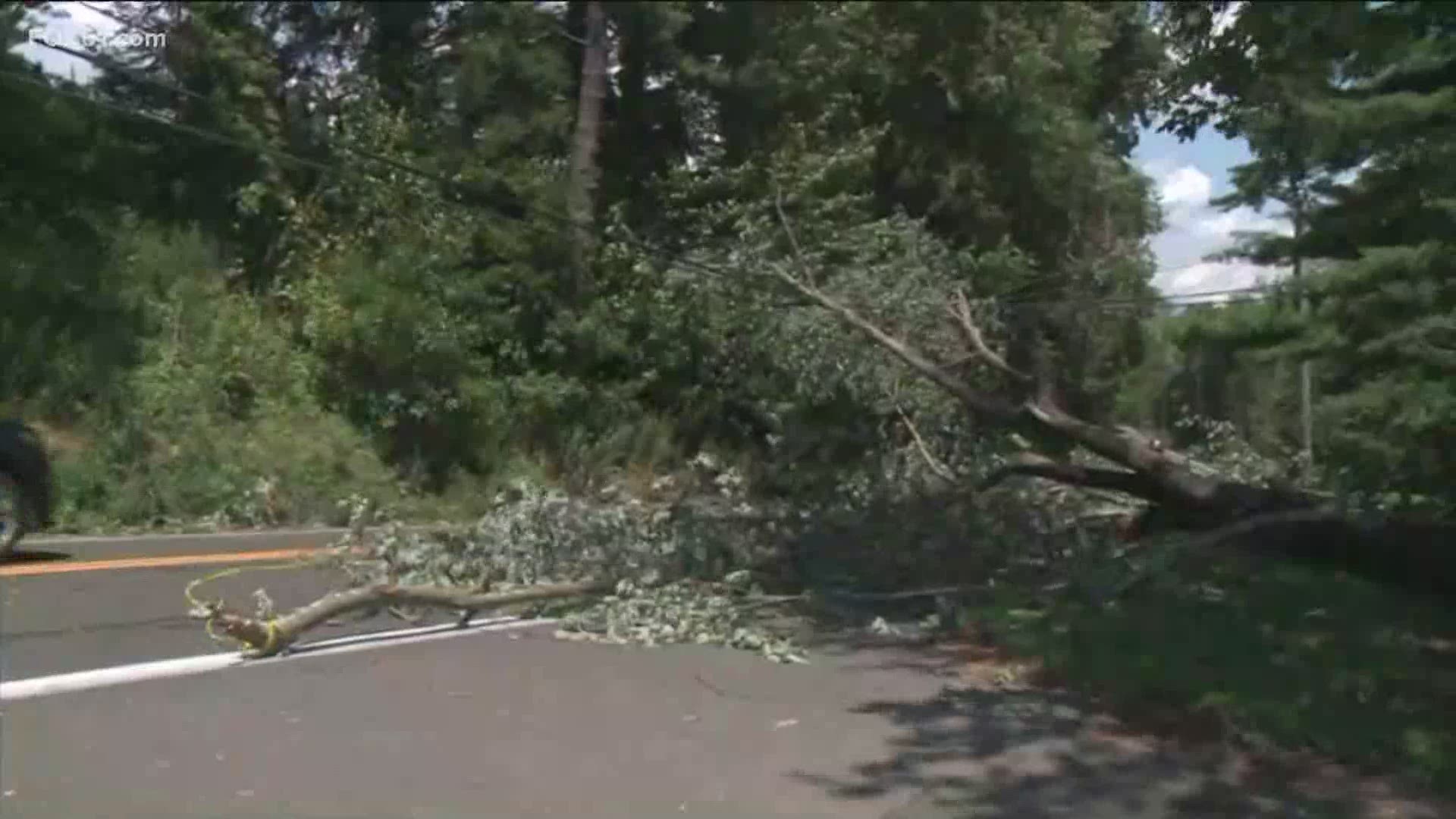HARTFORD, Conn. — A listening session for the Connecticut Energy & Technology Committee was held Tuesday for submitted testimony.
The testimony surrounds the committee's proposed bill that calls for changes to Eversource and United Illuminating following their response efforts to Tropical Storm Isaias. You can read that bill here.
Read the full testimonies below.
The storm left upwards of 700,000 in the dark, and many were critical of the companies and their clean-up efforts to restore power. Some customers didn't see power for nearly nine days after the storm.
Members of the committee have voiced their frustration, as well as leaders like Senator Richard Blumenthal and Governor Ned Lamont.
The storm response also came just after customers saw their electric bills skyrocket in July.
The Connecticut Public Utilities Regulatory Authority had held a hearing regarding both the concerns over rates and the storm response.
During the hearing about the rise in rates, Sen. Blumenthal gave testimony, calling for a major change in how Eversource and United Illuminating operate. He called for a performance-based rate pay as well as the idea of breaking up Eversource.
The Westport First Selectman also submitted testimony. You can read them below:
Westport First Selectman Jim Marpe:
On behalf of the residents of the Town of Westport, and as its First Selectman, I extend my sincere thanks to the CT General Assembly’s Energy & Technology Committee for holding this forum. I want to use this opportunity to recommend that the State authorities require Eversource to rethink its emergency response protocol and find ways to make better use of its existing resources. Rather than raising its rates, the utility should examine its processes and how they can be made more effective and efficient than what was shown during the response to Tropical Storm Isaias.
RATE INCREASE
Eversource has been required to halt its rate increase during this time of financial hardship and fragile public health. I also believe the rate increase should be rolled back for a more thorough look at how the utility utilizes its existing resources. What I witnessed from Eversource during Storm Isaias was a lack of coordination and accountability. Whether it was repair crews sitting idle in their vehicles waiting for direction, or Customer Service Technicians taking calls without accurate or useful information, resources were being wasted and were not being utilized. Rate payers rightfully expect more from the utility company and should not be forced to fund resources that are being mismanaged.
STORM ISAIAS RESPONSE
Westporters are well aware of the destruction that Tropical Storm Isaias brought to our community. In its immediate aftermath, 97 percent of Eversource’s Westport customers (households and businesses) were without power. Trees and debris, often including utility wires, blocked roads and driveways, trapping many residents in their homes and preventing emergency response personnel from responding to potential life-threatening situations. Traffic signals were not functional, causing hazardous driving conditions for those who could venture out. Businesses and those working from home were unable to communicate due to the loss of power, cellular and WiFi services.
What was most discouraging, however, was Eversource’s delayed make-safe process that took days to commence. Westport officials stood ready to respond, but in many instances, were paralyzed in the 48-hour period following the storm, while awaiting Eversource to make our community safe by de-energizing their downed wires. This left residents in those blocked areas stranded and helpless should a medical or life threatening emergency occur. The most critical part of the town’s storm response is to be able to help those in immediate need or distress. Such blocked access cannot be an acceptable scenario in America in the year 2020. We need the utility companies to know that they must organize to make communities safe as quickly as possible following any storm. Any delay to “make safe” leaves our residents extremely vulnerable and helpless.
To compound the issue, many residents were also without cellular service or WiFi. We could not reach residents through mobile, landlines, email, website or social media communications. Being unable to physically reach those same individuals left the town in a desperate state.
In Westport, Eversource was mostly non-responsive, non-communicative, and unable to coordinate with the town when it did begin restoration. I would like to share some examples of Eversource’s lack of coordination and communication with Westport during Storm Isaias.
1. Eversource’s response was delayed and unorganized:
- Per Eversource’s regulations, towns should have been provided a “make safe crew” within 24 hours after the storm, so that wires could be de-energized before any tree work or clean up could begin. Westport was told it would get two crews at 6am on Friday, approximately 60 hours after the storm, but was then told one crew was on its way at 10am. The one crew arrived much later. As a result of Eversource’s inefficiencies in providing a timely “make safe” crew(s), Westport’s Public Works response was unable to address wire-related incidents for three days after the storm. Eversource could not make the community safe by de-energizing their wires first.
- Westport was only given one make safe crew, which was insufficient with 97% of the town being without power.
- Other Eversource crews were doing restoration work even though make safe was not yet complete.
- Eversource technicians, or their subcontractor crews, were reported idling for many hours at various school parking lots, while they awaited guidance and instructions.
2. Ratepayers overwhelmingly complained of poor Eversource customer service:
- Ratepayers had difficulty reaching an Eversource Customer Service Representative to report and follow-up on outages. When contact was made, many Representatives refused to initiate work orders because their records indicated that either the power in the respective area had been restored, even when it wasn’t, or that the entire neighborhood was out, thereby negating the need to report the outage. Ratepayers should have the ability to understand Eversource’s procedures and should expect a reasonable level of customer service – particularly in an emergency situation- so they know when they need to report and follow up on an outage, versus when they do not.
3. The Town was unable to get key information from Eversource:
- Despite numerous attempts, Westport officials were unable to reach the Eversource Operations Center until the afternoon on the second day after the storm. Substantive contact between a municipality and Eversource should be made within 24 hours after a storm, and ideally before the storm begins.
- Eversource outreach to the town was sporadic and often consisted of general briefings, which did not have useful or specific information.
4. There was a lack of coordination between Westport and Eversource:
- Westport emergency response leadership was not told where the restoration crews would be located, so our clean-up crews were unable to follow the crews and coordinate with Eversource.
- The Westport Emergency Management Director was told late Friday that National Guard troops would be coming at 9am the next day. Westport did not know what the National Guard would be doing and was not told where the troops were working. Instead, Westport had to use its Police Department to find the Guard. As a result there was no coordination between the Town and the National Guard.
- Westport’s liaison at Eversource would not accept the town’s list of blocked roads and instead told the DPW to call the outages in. This is not the standard protocol. Eversource later provided an unmanageable spreadsheet for the town to enter the outages.
- Even toward the end of the restoration process, Eversource still could not tell Westport specifically where their crews were working.
In the 48-hour aftermath of the storm and tornado, there was no information or specific restoration plans forthcoming from any Eversource representative or official, other than general information. We could only quote the Eversource website information, which was inaccurate and vague.
CONCLUSION
In summary, Westport and its residents found Eversource’s performance during Storm Isaias to be unacceptable. Its inability to quickly respond to life and property threatening “make safe” situations was irresponsible. Its failure to communicate immediate with our emergency response team and our residents introduced additional risk and anxiety into an already difficult and dangerous situation. Additionally, its apparent struggle in communicating effectively on an internal basis has left us wondering about the quality and responsiveness of Eversource in future disaster situations.
We encourage Eversource to rethink its internal processes and use of existing technologies to achieve a better disaster response and communications standard to better assure that life threatening and quality of life disruptions are understood. And we ask our legislative and regulatory oversight bodies to establish and enforce the necessary penalties and economic incentives to make that happen.
Going forward, Eversource needs to work with the Connecticut municipalities on a better emergency response protocol. It needs to find ways to better utilize their resources, specifically existing technologies that track outages for public information and track and dispatch technicians for a more cohesive storm response. Additional rate payer funding should not be used to support emergency response processes that are inefficient and disorganized. I strongly advocate that Eversource find the solution to their budgetary issues through savings from within the organization, as opposed to putting more rate payer dollars into a process and technology that has already proven to be broken.
Senator Richard Blumenthal (CT-D):
I appreciate the opportunity to support the goals of LCO 3920, An Act Concerning Emergency Response by Electric Distribution Companies and Revising the Regulation of Other Public Utilities to hold accountable Eversource and United Illuminating for their performance during storm response and to limit expenses that are charged to ratepayers.
The legislature has a huge, historic opportunity, which it should meet with bold, historic action. Like you, I have heard unprecedented outrage and frustration as I’ve traveled our state— a galvanizing grassroots demand for reform, now cresting. A public utility like Eversource should be truly public— putting people before profits, downsized and managed to be really responsive, and even owned by the people of Connecticut.
I urge the committee to move quickly to link rates to the performance of the utility. I also urge the committee to consider breaking up Eversource to establish a Connecticut based utility either publicly owned or investor-owned subject to performance based rates.
For too long, Connecticut electricity consumers have overpaid for underperformance. The guaranteed rate of return for utilities has ensured that utilities have little to no risk of losing money while consumers pay for substandard responses to power outages.
Bold aggressive action at both the state and federal level is necessary.
The delivery of electricity from the power plant to the home or business is practically performed by a monopoly of one or a series of entities. It has been clear that this is not an area where competing private businesses can easily operate. As such, for the past hundred years, a company or governmental agency has been designated – at the federal level by the Federal Energy Regulatory Commission (FERC) or at the state level by the Connecticut General Assembly -- as the ‘public utility’ to move electricity over transmission and local distribution lines.
This private or public monopoly needs strict oversight – something that has become much more difficult as we have let these monopolies grow into multi-state, mega-dollar behemoths.
Now is time for a reset at both the federal and state level.
I commend the Energy and Technology Committee for working in a bi-partisan manner to draft LCO 3920. This bill would link rates to performance, require reimbursement for damages to consumers for delayed storm responses and limit the types of expenses such as appearing at PURA hearings and executive compensation that are charged to ratepayers.
I urge the Committee to consider breaking up Eversource. The General Assembly established the forebears of Avangrid and Eversource and what the legislature giveth, the legislature can taketh away.
The process could be difficult but not impossible. For example, the Committee could consider a series of incentives and disincentives for Eversource and Avangrid to spin off their Connecticut utilities -- Connecticut Light and Power and United Illuminating -- into independent companies or as publicly owned entities.
The Committee should also ensure that if we maintain an investor-owned company as our utility that PURA has the resources and expertise to properly oversee such operations and that similar adequate resources are provided for a consumer counsel office to effectively present the consumers’ interest to PURA, countering the millions of dollars that these utilities bring to bear on the legislature and PURA to advance their own private interests.
I am supporting a similar initiative at FERC where the consumers’ voice does not have a federal agency on its side.
I also support the review required by LCO 3920 of the performance of the wholesale electricity markets currently governed by ISO-New England. ISO-NE has not worked in Connecticut consumers’ or environmental interests. ISO-NE is established by FERC and I have repeatedly asked FERC to provide better oversight and regulation of ISO-NE’s decision-making process. FERC has failed to do so. Therefore it is long overdue for a thorough analysis of whether ISO-NE is the best option for Connecticut ratepayers.
There is a lot of work to be done at both the federal and state level to make our electric utilities responsive to ratepayers. I commend the Energy and Technology Committee’s initiative at the state level and hope that Connecticut’s experience can persuade consumer oriented action at the federal oversight level as well, which I will continue to advocate.



